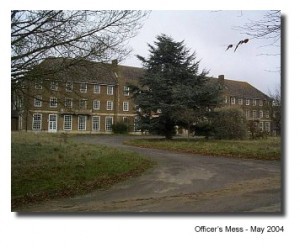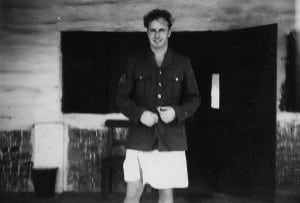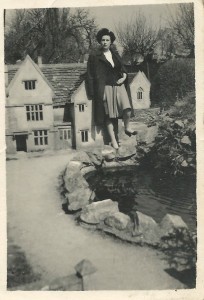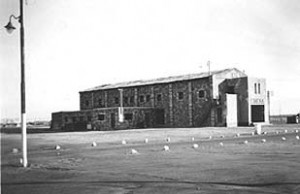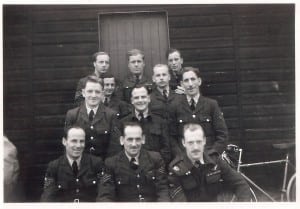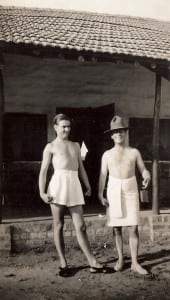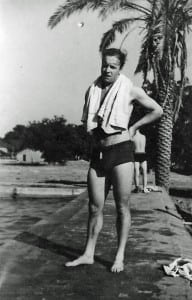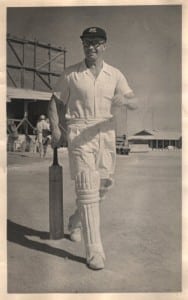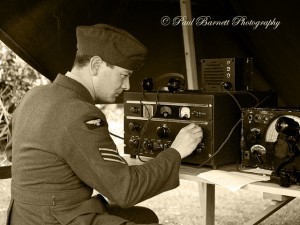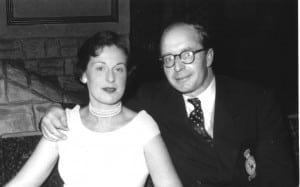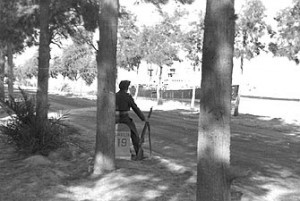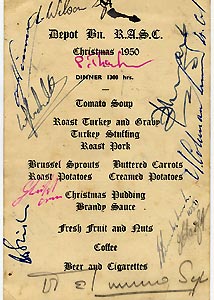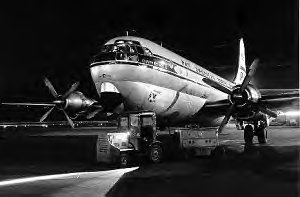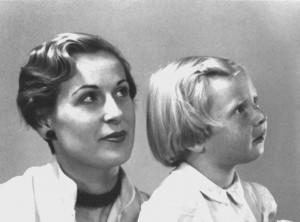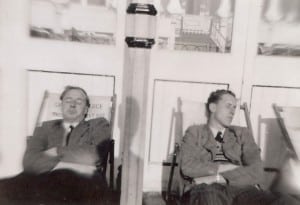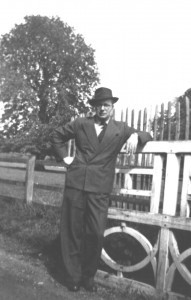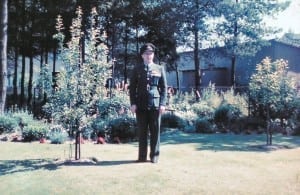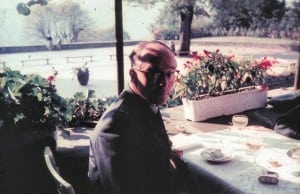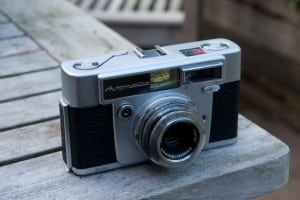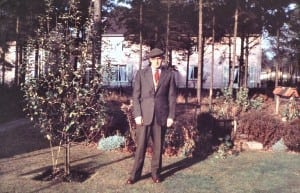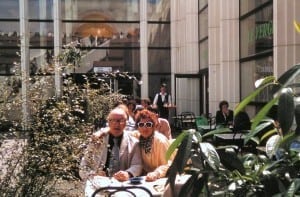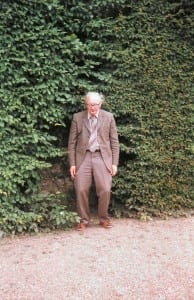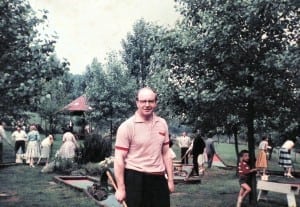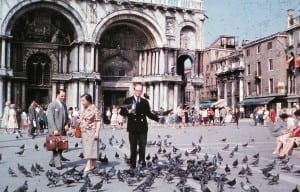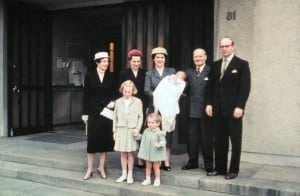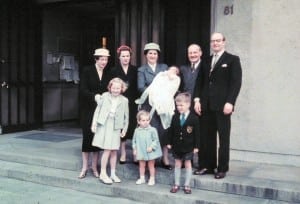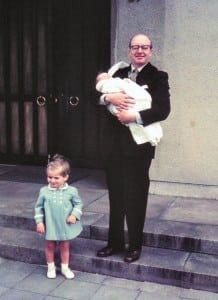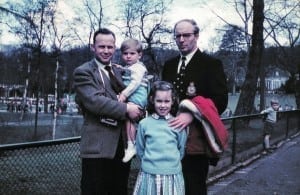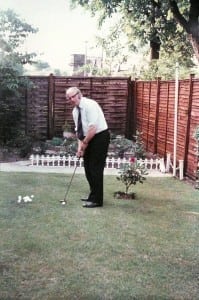An Officer and a Gentleman: The Life and Times of Vic Riding
Victor Riding 1919-1982
Husband of Peggy, father of Julie, Sally and Simon
Vic Riding was a man of infinite charm who combined a gift for friendship with a sense of fun. That made him a wonderful addition to the Minchin family when he joined it through marriage to Peggy, at the altar of St Lawrence’s church, Bourton.
In the late 1940s, after the end of World War II, Peggy continued to enjoy the weekly dances held in the officers’ mess at RAF Little Rissington three miles from Bourton. In 1948 a new face arrived at the camp. He cut a dashing figure in his dress uniform in air force blue. Vic and Peggy began courting. She introduced him to her parents, Bill and May, and he charmed them as he was able to charm most people. For May Michin, Vic filled the role – vacated by Ken Dale a few years before him – of being the son she had never had.
Vic and Peggy were wed in 1949 and went on to have three children: Julie, Simon and Sally. With Vic in the military, it was a peripatetic existence. They spent part of their married life stationed in Egypt, then Rheindahlen, West Germany, then RAF Feltwell in Norfolk. Vic became a Flight Lieutenant and served 17 years 127 days before retiring at his own request and settling down to the delights of civilian life.
It came as a terrible shock that Vic’s life was cut short. He died suddenly on 23 March 1982, aged 61. His death was a great lost not only to Peggy and their children, but to all the Minchin family and their friends. Thirty years later he is still fondly remembered as a fine in-law and a popular uncle as well as a great dad. If he had had the opportunity, he would have loved taking part in the Minchin get-togethers, as would have Peggy. They both loved to socialise.
One fortuitous legacy of Vic is that he was a keen photographer, with a top-grade camera and plenty of colour film, at a time when the world was mainly recorded in monochrome. He had an eye for a picture and the persuasiveness needed to put it into effect. His priceless bequest to the Minchins is a collection of 500 photos which resonate with time and place, character and faces. Some of them have been used to illustrate other articles throughout this website, thanks to the diligent efforts of his son Simon in copying them from their transparency format.
This article showcases those images which focus more sharply on Vic’s earlier life and personal narrative. Other articles are dedicated elsewhere to Peggy and Vic’s family as a whole.
Victor Henry Riding was born on 22 September 1919 in Gillingham, Kent, the son of Frederick Riding, a seaman, and his wife Harriet. After leaving school, he became a parlour boy employed by the Rev. Brownrigg at Astley Rectory in Stourport, Worcestershire. Serving tea and biscuits to elderly ladies was not to his taste. He had ambition and the great excitement of the 1930s was to fly. At the first opportunity – In 1935, aged 16 – he joined the RAF as a Boy Entrant at West Drayton Recruitment Centre and was dispatched to the Electrical & Wireless School, at RAF Cranwell, Lincolnshire.
Britain was rearming and preparing for round two against Germany, now being led by Adolf Hitler. These were historic times to be under military orders.
At 18 he became an Aircraftsman 2nd Class – no 550535 – based at RAF Hornchurch alongside 54 (F) Squadron. He transferred to RAF Kenley and underwent Air Ministry Wireless Training in London and, on the outbreak of war in 1939, moved to RAF Stanbridge at Leighton Buzzard. These are place names which would become familiar during the Battle of Britain as some of the main fighter bases defending the country from Nazi air attacks.
At 23, he was promoted to sergeant, moving to Bampton Castle, then Chigwell, specialising in mobile signals. He was both a radio operator and a radio fitter.
After the D-Day landings in June 1944, he transferred to France, again in mobile signals, with 83 Group, which was controlling air attacks being made on the Nazi war machine by Spitfires and Mustangs.
It was these skills which, after the European fighting ended in May 1945, meant he was immediately transferred to Air Command South East Asia, and based in Baroda, India, while the war against Japan continued.
In 1946 he re-engaged in the RAF for the next 24 years. By 1947 he was back in Britain and in 1948 he was stationed at RAF Little Rissington. In the six months he was there, he met Peggy Minchin, an encounter which would shape the rest of his life. Vic and Peggy married on 8 August 1949 in Bourton.
In 1950, the government declared an ‘Emergency’ in the Suez Canal Zone, Egypt, where British troops were based. The Egyptian government wanted them to leave and there were stabbings, riots and fires. As extra troops were dispatched, Vic was posted to the Middle East Air Force at RAF Kabrit. By this time Peggy was pregnant and stayed behind. When the time came she was admitted to the maternity unit at Moreton in the Marsh hospital and gave birth. The first thing the Minchins did was to send a message to Vic, saying: ‘Congratulations, you’ve got a daughter, Julie.’
Flight to the East
Vic was granted leave and boarded a plane which flew him back to Britain. Soon he was sitting beside Peggy holding their first child. His leave ended and he returned to Egypt and waited to be joined by his wife and daughter. Six weeks later Peggy carried Julie aboard a Boeing Stratocruiser and it lifted into the sky and they were on their way, to another continent and another life. It was the first time Peggy had flown even though she and other Bourton people must have often looked up and wondered at the silver exhaust trails in the sky leading in and out of Little Rissington.
Julie was placed in a tiny hammock while Peggy gazed from the cabin window. The green fields of England slipped away to be replaced by the blueness of the Mediterranean and then the yellow sands of North Africa. The plane was propellor driven, so very noisy, and cruised at a modest 340mph. After ten hours in the air the Stratocruiser bounced down onto a dusty runway and Peggy stepped out into a wall of heat. It was the first time she had travelled abroad and it must have seemed unbelievably glamorous compared with the chilly, rationed austerity of home. There were servants and domestics and she was able to experience a last gasp of colonial pampering in this crucial enclave of the British Empire, which was entering its death throes. And off the RAF base, mingling with the locals, she would have seen a world both exciting and exotic. Blazing sun beat down all day and they were near the sea. Although there was some fighting, life for military wives was sheltered and comfortable.
By 1952 they were back home, at RAF Medmenham with Vic on short assignments to other bases: Benson, Truleigh Hill, Millom, Beachy Head, Bawdsey and Chigwell. In 1954 Vic was recommended for a commission, enlisted in the Officer Candidate Training Unit and passed an examination with marks of 70.2 per cent. By this time he had had plenty of medals to pin on his tunic breast: 1939-45 Star; the France and Germany Star; the Defence Medal; the War Medal; and the Long Service and Good Conduct Medal. His service record shows his character marked as ‘Very Good’ and ‘Excellent’ at all times.

- From monochrome to a world of colour. This is Vic’s treasured Durst Automatica, bought when he was stationed in Rheindahlen, West Germany. Through its lens, we can bring to life the history of the Minchins. Simon Riding still has it and has curated the 500-odd photos which remain Vic’s legacy. Simon says: ‘Dad only ever used film for transparencies – instead of prints – and so he would invite people over to view them. It was a standard thing in those days. Slideshow evenings became a regular event. Most friends and relatives were subjected to a few hours of this as some stage! He always used the same projector and screen and the projector would regularly jam.’

- Between 1968 and 1976, the family moved to Bletchley, Buckinghamshire, where Simon and Sally attended Bletchley Grammar School. Simon says: ‘There is an historical link with Dad’s era. The school was built in the 50s on land that was previously part of Bletchley Park – home of the World War 2 codebreakers. There were lines of dilapidated timber huts – the orginal Hut 1 and Hut 2 etc where the German codes were broken – right next to the wire fence bounding the school playground. We often lost our ball over the fence. But we couldn’t got and get it back. Recovery was out of the question. The codebreaking was still classified and we just knew it as the GPO site.’

